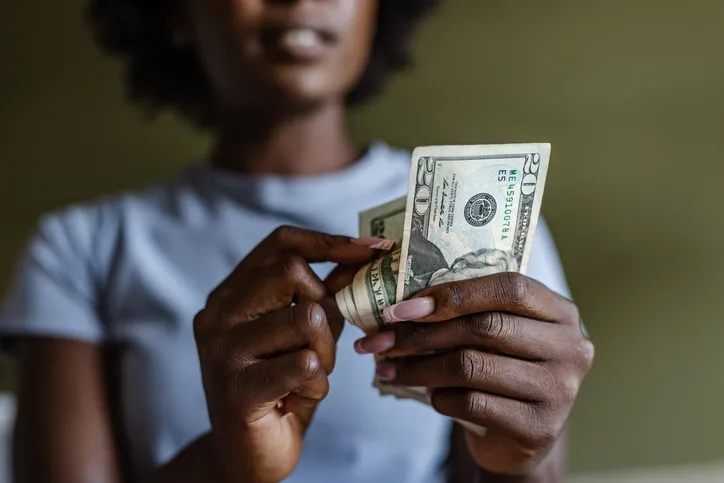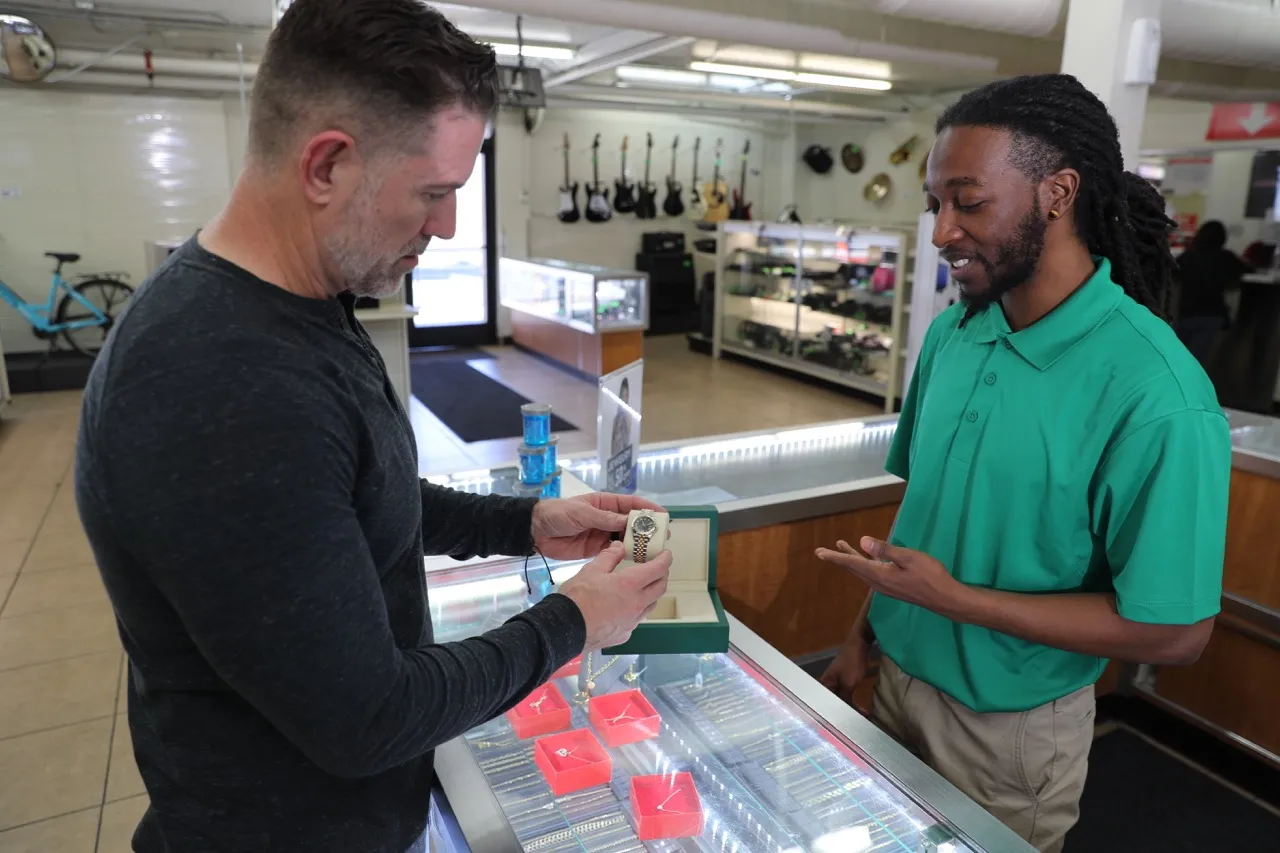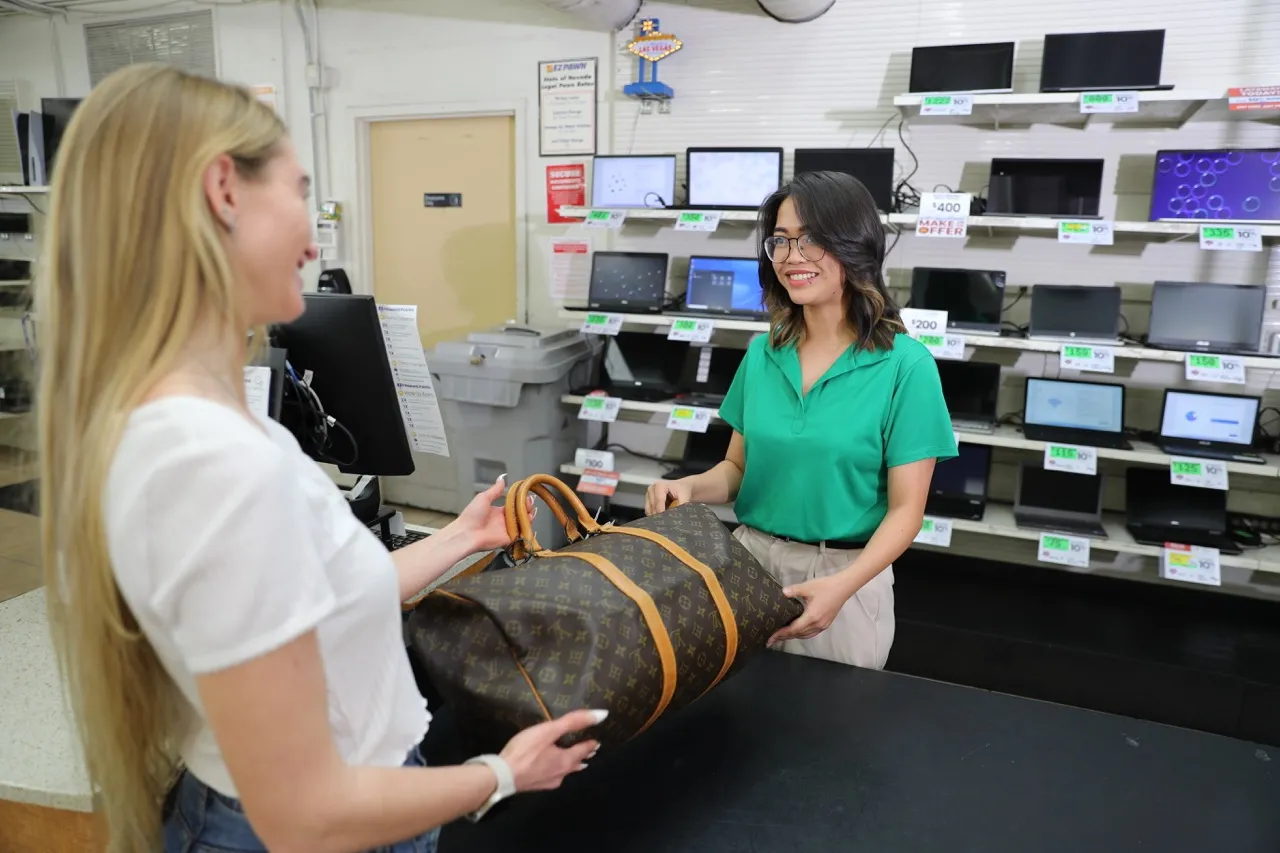
Published: Thursday, July 11, 2024
Are you considering a pawn loan but have some burning questions? Don’t worry, you're not alone! Pawn loans can be a great way to access quick cash, but it's important to understand how they work.
In this article we'll answer the top five questions about pawn loans:
1. What is a pawn loan?
2. What items can I pawn?
3. How much money can I get for a pawn loan?
4. How does the pawn evaluation process work?
5. What are the interest rates and fees for a pawn loan?
Bonus: What happens if I can’t pay back a pawn loan?
Whether you're new to pawn loans or have some experience, we’ll uncover the ins and outs of pawn loans in simple terms. By the end, you’ll know how pawn shop loans work, giving you the confidence needed to make smart financial decisions. In summary, this article will answer the top 5 questions about pawn loans.
Let’s get started!
1. What is a Pawn Loan?

Let's start with the basics. A pawn loan is a short-term loan where you use personal property, such as jewelry, electronics, or valuable collectibles, as collateral. The pawnbroker assesses the item's value and offers you a loan based on a percentage of its evaluated worth. Once you repay the loan along with any accrued interest, you get your item back. If you're unable to repay the loan, the pawnbroker keeps your item but doesn't report your inability to repay to credit agencies, protecting your credit score.
How It Works
- Bring in your item – Value Pawn lends on most items and does not conduct a credit check. Everyone qualifies. You must be 18 years of age (certain states may impose higher minimum ages) to get a pawn loan and a valid government issued ID is required.
- Get a loan - Value Pawn evaluates your item and let you know the cash amount we are able to lend. Value Pawn then holds your item and you get to leave with cash in hand! (The time period for the loan varies depending on state law.) And rest assured, when your item is in our care, Value Pawn keeps it safe and secure.
- Pay back your loan - To retrieve your item, just pay off your loan along with any fees. Of course, should you need more time, we offer extensions* and renewals, as permitted by law. If you choose to surrender your collateral, there is nothing further you need to do. You are free to not pay off your loan without judgment or any impact to your credit score.
Pawn Extension and Pawn Renewals
A pawn extension and a renewal, while similar, involve different terms for extending the life of a pawn loan.
Pawn Extension - This allows the borrower more time to pay back the pawn loan without losing the pawned item to the shop. The borrower must pay the interest that has accumulated up to that point to extend the loan term by a certain period. The availability of extensions and exact terms vary by state. The principal amount of the loan remains the same, and additional interest will continue to accrue during the extension period.
Pawn Renewal - A renewal is like taking out a new loan on the same item. The borrower pays off the accumulated interest and any other fees from the original pawn loan, and then they start a new pawn loan agreement with a new term, including new interest and possibly new fees. This effectively resets the loan's life, giving the borrower a full new term to repay the principal and the interest.
Both options provide flexibility for borrowers who need more time to reclaim their pawned items, but the choice between an extension and a renewal depends on the borrower's ability to pay at the time and their long-term financial strategy.
*Not all services are available in all areas. Pawn extensions not offered in Arizona, Oklahoma, Oregon, Pennsylvania, or Wisconsin.
2. What Items Can I Pawn?

You can pawn a wide variety of items at a pawn shop, including but not limited to:
- Jewelry: Gold, silver, diamond, and platinum jewelry, as well as designer watches
- Purses/Handbags: Handbags, purses, totes, shoulder bags, luggage and other bags
- Electronics: Laptops, tablets, gaming systems, TVs, cell phones, speaker systems – anything that plugs in or requires a battery!
- Tools: Hand tools, power tools from popular brands, and other equipment
- Musical Instruments: Guitars, string instruments, brass instruments, percussion instruments, and more
- Rare Collectibles: Artwork, rare coins, cards, and memorabilia
- Sporting Goods: Kayaks, golf clubs, skateboards, snowboards, skis, and bikes
- Transportation: Cars, boats, motorcycles, and other forms of transportation
The specific items accepted as collateral may vary by pawn shop, so it's best to inquire with the pawnbroker about the acceptability of a particular item.
These items are used as collateral for a cash loan, and the size of the loan is based on the evaluation of the item. If you have any questions about the items that can be used for a pawn loan or are considering pawning an item, it's advisable to visit a Value Pawn and ask a Team Member for details.
3. How Much Money Can I Get from a Pawn Loan?

The amount of money you can get from a pawn loan depends on the value of the item you bring in1. Typically, pawnbrokers offer a fraction of the item's retail value, and/or market value, as they need to account for the risk of not being repaid and depreciation of the collateral. The loan amount can range from as little as $20 to several thousand dollars, depending on the item's value. Some states cap the maximum loan amount pawn shops are allowed to offer.
4. How Does the Pawn Evaluation Process Work?

The evaluation process is crucial in determining the loan amount you'll receive. When you bring in an item for an evaluation, the pawnbroker assesses its condition, market demand, and resale value. Factors such as brand, age, and authenticity also influence the evaluation. It's essential to bring in items in good condition to maximize your loan amount. Remember, pawnbrokers want to loan as much as they can while still safeguarding their investment.
5. What are the Interest Rates and Fees for a Pawn Loan?

Pawn loans often have higher interest rates than traditional bank loans due to their short-term nature and the risk involved for the pawnbroker. The specific interest rates and fees can vary by state and by pawn shop, so it's important to ask about these details before agreeing to a loan. Be sure to understand all the terms and costs associated with the loan before finalizing the agreement.
What Happens if I Can’t Pay Back the Pawn Loan?

If you're unable to repay the pawn loan by the agreed-upon date, the pawnbroker will keep the item you used as collateral and will sell it to recoup the money they lent you. However, defaulting on a pawn loan does not affect your credit score or report and it doesn't result in debt collection. Talk with the pawnbroker if you're having trouble repaying the loan to see what your options are.
Pawn Loans Made EZ

Pawn loans can be a viable option for obtaining quick cash when needed. By understanding how they work and asking the right questions, you can make an informed decision about whether a pawn loan is right for you. If you have more questions or are considering a pawn loan, feel free to visit your nearest Value Pawn location to speak with our knowledgeable staff.
We hope this blog post has been helpful in addressing your top 5 questions about pawn loans. Note that it's important to carefully consider the terms and costs associated with a pawn loan before proceeding. If you have any further inquiries or need assistance, please visit the store and ask a Team Member.
References
1 - Item evaluation and amount of cash offered on purchases or pawn transactions is at the sole discretion of the Pawnbroker. Conditions apply. Pawn transactions are a loan subject to terms and conditions, including fees. Please see a Team Member for additional information.


